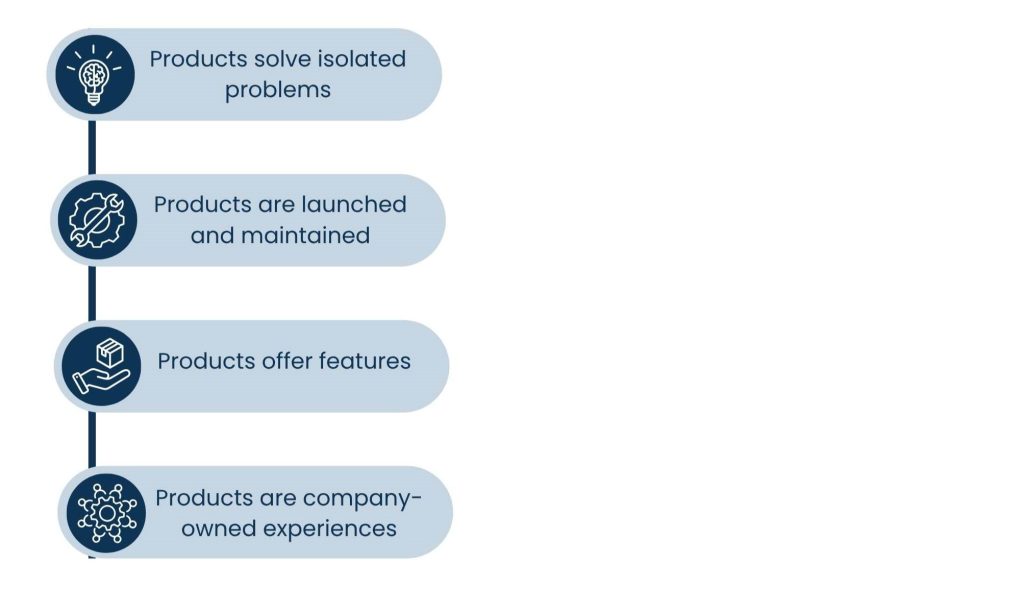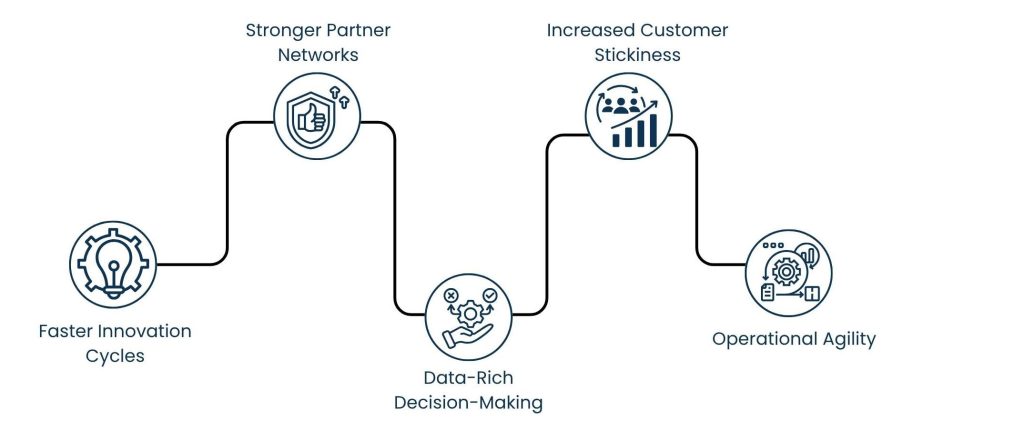Introduction
Digital Platform Consulting isn’t about creating one-off apps or complex tool sets anymore. It’s all about engineering connected ecosystems where users, partners, systems, and data continuously interact, enabling us to create value.
Whether you are building a digital procurement platform that helps optimize vendor operations, a digital asset management platform that facilitates content collation, or are committing to building a full-blown digital platform, one thing is absolute; standalone thinking is outdated.
There is a paradigm shift from now to the future, and the companies that manage to succeed are the ones that are oriented by way of platform thinking. This is about designing for scale, allowing third parties to build upon what you have built, and creating systems that get smarter as they are used. You’re not just putting out a product; you’re creating a vibrant space for others to innovate, integrate, and contribute to.
That’s where digital platform consulting comes in. Consultants have the strategic vision to synthesize and align technology with a long-term business model so that your platform can work not only as an effective tool but also as a cornerstone to future growth.
In this blog, we examine the role of digital platform consultants in helping companies transition away from the traditional product-centric development style in favor of an ecosystem-centric one, and why this transition is an imperative for creating sustainable digital success.
Reflections On The Role of Products In The Digital Age
To succeed in today’s digital economy, an isolated product is not enough. Today, companies aren’t merely solving singular problems; they are building the contexts of continuous value exchange. This change from product focus to platform thinking is radically transforming how companies innovate, capture, and compete in new markets.
This is the key difference: products are stationary, meant to fill a certain need. Platforms are living systems, intended to allow for engagement and iterate as users, partners, or technologies mature.

Let’s break it down:
1. Products solve isolated problems
They are usually more targeted in scope; they do one thing and cater to one user group, such as following orders, managing documents. Platforms, on the other hand, allow these interactions between a network of participants, suppliers, teams, customers, and machines, with value creation being a networked effect.
2. Products are launched and maintained
They are commonly linear in construction. Platforms, however, grow and adapt. The more people plug into the platform, the more opportunities to engage, integrate, and monetize.
3. Products offer features
Platforms offer network effects. The more users or service entries into a platform, the more valuable it becomes. For example, consider a digital procurement platform where vendors, buyers, and payment gateways interact in real-time with unison of application.
4. Products are company-owned experiences
Platforms enable third-party contributions. Whether it’s onboarding vendors with their catalogs or developers with their plugins, platforms are designed to scale beyond their intended niche.
Here is where Digital Platform Consulting provides focus and order. Consultants are able to aid business leaders in understanding that it’s more than just building a tool, but an environment for scalable, repeatable, and collaborative value creation. You help them understand your digital goals, and they create a systems design that is not just meant to manage internal things but also to unlock that which is external.
For instance, the need of an organization can be as simple as a need to share assets, but evolve into more than a simple repository of assets, which includes company-wide workflows, user-controlled access rights, metadata tags, and external usage. That evolution, product to platform, is no accident; it’s an intentional and strategic decision.
The best part? A well-architected platform should inherently drive faster digital transformation, rather than slowing it down. Things are much easier when you’re built with ecosystem thinking: it’s easy to reconcile data, adopt new tools, and onboard new users.
Through digital platform consulting, companies stop asking “what can we build” in favor of “what ecosystem can we enable,” and that attitude paves the way for an enduring competitive edge.
The influence of digital platform consulting on ecosystem-first thought
Digital Platform Consulting helps business executives shift their focus from software features and start seeing the value ecosystem. It’s not just what you build; how it comes together, expands, morphs, bends. Consultants enable you to put some perspective around that and direct you in a clear and outside-in fashion so that your data pipeline is not only positioned for immediate success, but is also poised to meet the long-term ecosystem goals of the future.

Here’s how they navigate that transition:
• Define the Ecosystem Vision
The first is to map out the entire value chain. Consultants then work with leadership teams to define all possible platform participants: internal users, external partners, customers, vendors, and even third-party developers. They describe what each participant does and gets out of the platform, laying the groundwork for scaling interactions. It’s not just features; it’s roles and relationships.
• Enable Interoperability Across Systems
A disjointed system can stall ecosystem growth. With the help of consultants, you make sure your platform is ready to handle the dynamic and seamless data exchange through standardized API, integration protocols, and modular system architecture. Whether it’s a digital procurement platform that requires linking up with inventory and finance systems or a CRM that needs to sync with an array of third-party tools, interoperability is crucial for ecosystem fitness.
• Scale and Modularity in Design
Ecosystems need room to grow. Platform consultants design such architecture for you; you add new features without affecting the current ones. For instance, a digital asset management system might start out as a means to share files internally, and then grow to enable role-based access, global search, and partner portals. This versatility is supported from the very onset by modular design.
• Encourage Third-Party Participation
The most powerful aspect of a platform is the ability for other people to build upon it.” Look to consultants to help you set up development-friendly environments for companies with APIs, SDKs, and clear documentation. This allows room for external providers, partners, or integrators to join your platform, providing a greater reach and utility compared to what your internal teams can build themselves.
• Monetize Ecosystem Interactions
Consultants deliver you from linear pricing and into new revenue growth: Good luck with your newfound ecosystem. That extends to pricing: fees on transactions, partner access levels, data licensing, and usage-based pricing. You are not only selling something, but you are selling your platform as an income/recruit/distribute opportunity, where you make money doing it, they make money doing it, and so on.
With the right digital platform consulting, organizations do not merely implement tools, but they grow full ecosystems that can scale without overwhelming, change without massive handholding, and provide value without limits.
Impact: Reflecting on Platform Evolution
Once companies embrace a platform mindset, they no longer limit themselves to solving their problems; they start building digital environments that enable partners, customers, and users at large. This is where Digital Platform Consulting reinvents its value, moving it from execution to orchestration.

Breaking it down with real-world examples of platforms that transcended their original intent:
• A Procurement Tool Turns Into a Vendor Hub
A firm that started with a basic buying tool evolved into a full-featured digital procurement product. With some consulting from a hired expert, they installed supplier onboarding, automated compliance checks, and real-time vendor performance analytics. What began as a way of keeping track of costs expanded organically into a shared vendor management environment.
• A File Repository Grows Up to Be a DAM System
The in-house file storage system created for a marketing team evolved into a digital asset management system that centralized various external agencies, controlled the roles users had, and kept a consistent brand across global campaigns. Consultants also set up levels of access, added data tags that restrict access to certain people and departments, and brought in platform governance with divisions in the business.
• How a Bureaucratic Work In Some Ways Became a Transformation Platform
One company seeking to streamline HR and finance found itself with a digital transformation platform featuring ERP, CRM, employee portals, and an analytics dashboard. It wasn’t just individual tools of the trade anymore; it was an environment that streamlined data visibility and decisions across departments.
In each case, the change was not by accident; it was the result of careful and deliberate planning, architectural foresight, and outside consulting. The point was not to “complete the product” but to future-proof the system and open doors to more usage and scalability.
What consultants do differently is to help companies ask the right questions earlier:
- Who could also benefit from this platform?
- What else should connect to this from other teams/departments/external customers?
- How will information be transmitted through the ecosystem?
- Is the use, access, or features over time something we can monetize?
Rather than introducing the one-off tools that would demand rework down the line, companies are building ecosystem-friendly platforms from the beginning. Consultants make sure the platform scales as your business scales, not hinders it.
With this model, you can have smarter workflows, new revenue models, and healthier relationships. With digital platform consulting, businesses are not just fixing problems, but building infrastructure for growth, innovation, and market leadership.
The Ecosystem as a Strategic Asset to Platforms
A mindset that puts the ecosystem first doesn’t just shift how platforms get built, but what they end up achieving. Your digital platform has been a tool factory for the last ten years? With Digital Platform Consulting, organizations can move from being a tool builder to being a value creator. On innovation, operations, and customer engagement. This results in tangible benefits.

And let’s take a deeper look at the strategic advantages:
• Faster Innovation Cycles
Modular platforms are designed for modularity. New features, services, or integrations can be added without completely rewriting the core. Consultants work to architect systems where plug-ins and APIs enable continuous delivery. Instead of lengthy development cycles and dangerous rollouts, your teams can push and refine quickly, in time to meet market needs and customer demands.
• Stronger Partner Networks
An ecosystem platform invites collaboration. Third-party APIs, SDKs motivate suppliers, developers, and vendors to secure integration points. With a well-designed digital platform for procurement, suppliers can connect, share information, and transact, all with compliance and transparency. Consultants make sure these scalable connections are secure from the very beginning.
• Data-Rich Decision-Making
Ecosystem platforms bring together processes and interactions, which allow business leaders to get a unified view of the data. Between user behavior, vendor performance, and system efficiency, platform consultants will help ensure your digital transformation platform is architected to uncover actionable insights, based on data, leading you to make faster and smarter decisions.
• Increased Customer Stickiness
Your desire is for a personalized and integrated experience so you stay engaged. Ecosystem platforms facilitate end-to-end services, consistent user profiles, and tailored process flows. For instance, in digital asset management, users can access files, manage approvals, usage rights, and performance data, all from within just one platform. Consultants map out these journeys for you to retain and remain in a long-term relationship with a product.
• Operational Agility
A platform as an ecosystem model enables the reduction of redundancy and departmental separations. In place of disjointed systems attempting to communicate via patches and workarounds, you get fluid processes across the organisation. The platform’s consultants simplify the architecture, reducing overhead to scale teams, tools, and being able to adapt to circumstances quickly.
With Digital Platform Consulting, you’re not making better the way things are; you are taking a giant leap forward for you and your organization. It’s not about one product. It’s an interconnected, adaptable, future-focused system that builds a better network for your network.
When Should You Hire a Digital Platform Consultant?
Figuring out when to hire a Digital Platform Consultant can be the difference between building an app that will be useful today and an innovative platform that will take you into the next decade and beyond. Although some companies wait until they have a problem, the most successful involve consultants in strategic planning.

Here is when to know the time is right:
• Your tools can’t communicate with each other
You’ve got a bunch of systems: CRM, finance, inventory, support, but none of them work very well together. Teams are forced to manually duplicate efforts, transfer data, and manage various logins. A digital platform advisor can offer the expertise to design a unified architecture that allows systems to share data in real time.
• You are building a product-based business
Of course, if your team is just putting cost towards features and shipping, without at least some level of thinking about long-term scalability or other systems that your code is integrating with, you should be thinking a little bigger. Consultants coach you in platform thinking, working with you to make that shift from product-focused to ecosystem-building, which scales with your business.
• You can spot opportunities for growth, but scaling up feels risky
When getting large numbers of users onboard, working with partners, or launching in new markets, scalability is at issue. A platform consultant analyzes your current structure and blueprint for growth as you grow, without sacrificing performance, security, and flexibility.
• The potential for revenue has hardly been tapped
If value ends up being created through your workflows, data, or user behavior, and you are unsure how you could monetize it, some consultants can help you with that. From transaction-led models to user type tiers, they expose new ways that interactions within your ecosystem can be monetised.
• You’re about to rebuild or rethink
If your system is on the brink of an overhaul, avoid navigating this alone. A consultant makes sure your re-architecture will accommodate modularity, integrations, and long-term scalability. This will prevent another blockade and start your platform in line with the business idea, so that you can focus next on acquiring customers, not fixing the fundamentals.
The bottom line? Hire a digital platform consultant early on. Don’t wait until you’re bottlenecked or have a missed opportunity before you act. By engaging an expert during the planning stage, particularly when in the process of constructing or rebuilding a digital procurement platform, asset management system, or transformation suite, you not only futureproof your investment but also build a digital ecosystem that is well placed to adapt to the changing technology landscape.
Conclusion: We Design Ecosystems Not Products - The New Digital Standard
In a digital transformation world of growth, you can’t simply launch tools anymore. Organizations that buy into Digital Platform Consulting get not only a bunch of advice about how to build some tech, but they receive prescriptive advice about building scalable ecosystems.
Whether you’re building a digital procurement platform, a digital asset management platform, or even a larger digital transformation platform, the true value comes from empowering the interactions, integrations, and innovation in your ecosystem. Features are just one part of the equation; relationships and data flow are just as important, for the long term.
Platform consultants empower you to design for intent, not just for aspiration, by marrying business needs to structure, opening up the revenue model, all in service of a design that grows with your users. You transform from problem-solving pain points internally to creating digital spaces where customers, partners, and even systems flourish together.
We know it is all about the right talent and structure to make this vision a reality. Our seasoned virtual pros help businesses transform from product builders to ecosystem leaders.
Ready to shift your thinking? Don’t build another app. Build a platform that lasts.
About Us
Tasks Expert offers top-tier virtual assistant services from highly skilled professionals based in India. Our VAs handle a wide range of tasks, from part time personal assistant to specialized services like remote it support services, professional bookkeeping service etc. Furthermore, it helps businesses worldwide streamline operations and boost productivity.
Ready to elevate your business? Book a Call and let Tasks Expert take care of the rest.









